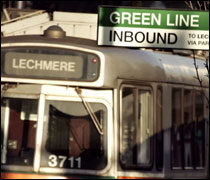The T: we love to hate it; we hate to take it; we take it everywhere. The nation’s first subway system has inspired songs (“The MTA Song” [Charlie on the MTA], “T DJ,” and “Fuck the T”), Web sites (www.badtransit.com, transportavenger.blogspot.com), and a general appreciation of functioning escalators. Over the next 10 years, the Massachusetts Bay Transportation Authority (MBTA) will present us with  more to sing about, and more to gripe about — from operational changes in how we pay our fares and what kinds of trains we ride (See “More Cards and Cars,”), to the completion of long-planned system-wide expansions that could increase daily MBTA ridership and help the struggling agency climb out of debt, while improving both our public health and our transit experiences. Boston’s minority communities suffer disproportionately from asthma, which is aggravated by heavy auto emissions. Congestion in the city, where close to one million commuters drive daily, is just getting worse. Upping T ridership, then, could lead to a healthier city.
more to sing about, and more to gripe about — from operational changes in how we pay our fares and what kinds of trains we ride (See “More Cards and Cars,”), to the completion of long-planned system-wide expansions that could increase daily MBTA ridership and help the struggling agency climb out of debt, while improving both our public health and our transit experiences. Boston’s minority communities suffer disproportionately from asthma, which is aggravated by heavy auto emissions. Congestion in the city, where close to one million commuters drive daily, is just getting worse. Upping T ridership, then, could lead to a healthier city.
But the MBTA — an independent state agency that serves more than 150 cities and towns in Eastern Massachusetts — cannot afford new projects. Fare revenues, about $275 million annually, bring in less than half of what is needed to operate the system, and massive debt, incurred through previous expansions, is estimated at around $4 billion.
Changes won’t be implemented by the MBTA alone, therefore, but by the state, which is currently planning expansions that will alter the T’s footprint in Greater Boston. These expansions — and their supposed benefits — have been a source of controversy for some 15 years already, and the debate isn’t over yet. The process will require compromise from the MBTA and the state, and realistic expectations all around.
Clean-air compromise
In 1990, before breaking ground on the Big Dig, state officials struck a deal with the Boston-based Conservation Law Foundation, environmental advocates who were suing the state over concerns that the Big Dig would bring more cars — and more air pollution — to Boston. To comply with the federal Clean Air Act, the state agreed to a series of public-transit upgrades designed to mitigate such adverse environmental effects. These included expanding commuter-rail and parking services throughout the region, building the Silver Line, extending the Green Line into Somerville and Medford, connecting the Red and Blue lines (providing riders from East Boston and the North Shore with easy access to Massachusetts General Hospital and Cambridge), and restoring E-Line service through Jamaica Plain, along Centre and South Streets, all the way to Forest Hills.
The logic was simple: provide more, and more convenient, public transportation, and more people will leave their air-fouling cars at home.